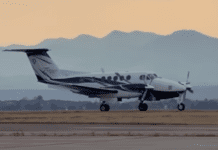This post is also available in:
 עברית (Hebrew)
עברית (Hebrew)
Groups of drones now can work together in networks for purposes such as traffic control, smart agriculture, surveillance and security systems, law enforcement, public safety, and much more. Critical missions could involve forest fires, traffic accidents, search and rescue or military operations. However, current drone systems are missing key considerations such as the ability to identify and respond properly to environmental and behavioral factors.
The US National Science Foundation has granted Abolfazl Razi, an assistant professor in the School of Informatics, Computing, and Cyber Systems (SICCS) at Northern Arizona University, believes that through computer programming drones can be developed to express situational awareness, recognize malfunctioning, suspicious, or invading UAVs, and make adjustments on the fly. “When we have hundreds of drones with limited communication ranges flying together, we need to keep connectivity and information flow uninterrupted,” Razi said. “The focus of this project is to enable UAVs to monitor themselves and each other, taking into account different scenarios.”
An important component of the project deals with adversity. “A drone that has joined a mission may show an anomaly and violate the set regulations for the mission. Instead of following the pre-planned motion trajectory, it may go dangerously close to other drones, for example,” he said. “We want other drones to be able to analyze the trajectory and identify misbehavior or misconduct, or even interference of an outside drone and diagnose the problems within a network.”
“If someone tries to penetrate your mission by sending in their own drones and making problems either on purpose or by accident, we want the UAVs to find the intrusion and cope with the situation.
The research is designed to make drones more independent of human control and observation, act like teammates by coordinating with others in their area and be able to identify intruding or enemy drones.
Razi will conduct experiments with UAV teams in his WiNeSH lab and outdoors in northern Arizona. “Each drone will be equipped with software capable of making decisions about the environment,” Razi said. “Also, each will have its eyes on the other drones and will observe whether its neighbors are making decisions that are rational or irrational.”
According to signalsaz.com, the research will include the human-inspired method of proactive learning from limited experience by exposing the software to various conditions and involve reverse engineering of the UAVs’ decision support system (DSS).
Prepared to dive into the world of futuristic technology? Attend INNOTECH 2023, the international convention and exhibition for cyber, HLS and innovation at Expo, Tel Aviv, on March 29th-30th
Interested in sponsoring / a display booth at the 2023 INNOTECH exhibition? Click here for details!


























